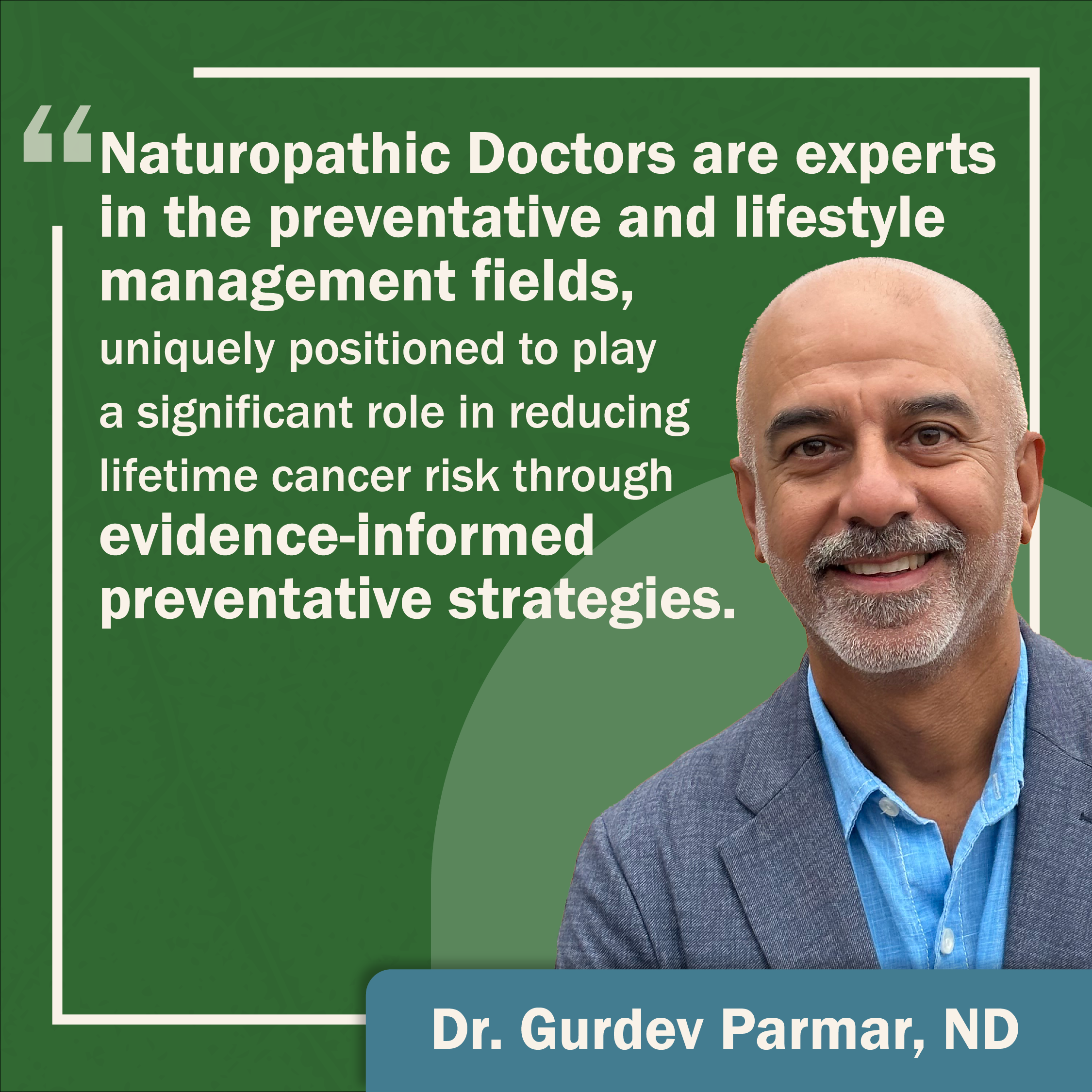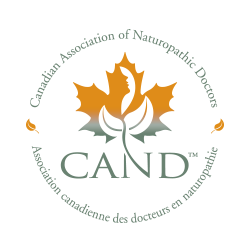23 Apr A conversation with Dr. Gurdev Parmar, a leading figure in the field of integrative naturopathic cancer care
ND Perspective
By: Gurdev Parmar, ND, FABNO (USA)
Cancer Awareness Month, observed every April, brings attention to the significant impact of cancer on the lives of Canadians and their families. With estimates suggesting nearly half of Canadians will be diagnosed with cancer in their lifetime, promoting early detection, supporting innovative research advancements, and improving access to cancer care across the country are essential.
Gurdev Parmar, ND, FABNO (USA), is the co-founder and medical director of the largest Canadian integrated healthcare facility, Integrated Health Clinic, located in Fort Langley and South Surrey, B.C. Licensed in Canada and the U.S., Dr. Parmar has pioneered locoregional hyperthermia treatment in Canada and was nominated to be the President of the International Clinical Hyperthermia Society (ICHS). Dr. Parmar is a leader in integrative cancer care, a supervisor of a naturopathic oncology residency, and the author of the Textbook of Naturopathic Oncology: A Desktop Guide of Integrative Cancer Care. Dr. Parmar is also the founder and Dean of Academics of the Integrative Oncology Institute (IOI), which is dedicated to providing comprehensive integrative oncology education and training for healthcare professionals.
This transcript has been edited for length and clarity.
 What’s one thing you want Canadians to know about the risk of cancer and the role of naturopathic medicine in cancer care?
What’s one thing you want Canadians to know about the risk of cancer and the role of naturopathic medicine in cancer care?
For 25 years, I’ve had the privilege of working with individuals navigating a cancer diagnosis. The prevalence of cancer has certainly increased during my career; today, approximately 48% of men and 42% of women in Canada will face a cancer diagnosis in their lifetime. It is estimated that up to 80% of cancers are linked to environmental and lifestyle factors. I believe strongly in the power of preventative medicine and lifestyle management to reduce cancer risk.
Naturopathic Doctors are experts in the preventative and lifestyle management fields, uniquely positioned— almost perfectly positioned— to play a significant role in reducing lifetime cancer risk through evidence-informed preventative strategies.
In British Columbia, access to publicly funded cancer screening varies by program. Mammography, colonoscopy, and cervical screening are available, while lung cancer screening with low-dose CT is specifically targeted to individuals who are current or former smokers, or with a lung cancer history.
Publicly funded cancer screening programs are however restrictive. Without a family or personal cancer history, screening isn’t typically available until someone is in their 40s.
Our Integrated Health Clinic is now offering a Cancer Screening and Prevention Program, through examinations and testing in patients with no signs or symptoms. Detecting cancer in its earliest stages significantly improves treatment success rates, making regular screenings essential to any proactive prevention strategy. Our advanced screening options include global diagnostics and FDA-approved tests not available in Canada’s public system, as well as whole-body MRI and skin mapping using Automated Total Body Mapping, a cutting-edge technology for early detection of cancers like melanoma—a good example of an easily preventable cancer. Patients come for their annual remapping, allowing us to identify subtle changes, and reducing the need for unnecessary biopsies.
Prevention is about more than early detection—it’s about understanding your unique health profile and actioning personalized prevention strategies designed for you. We create comprehensive, individualized prevention plans to maximize your health and minimize your cancer risks including stress management, nutrition, exercise, nutraceuticals, and some pharmaceutical interventions. We offer a tailored, a-la-carte approach to empower clients to achieve lasting wellness.
To determine whether cancer screening is something one should prioritize, we offer a Cancer Risk Algorithm that helps determine a person’s overall risk for developing cancer, and which type. This is based on the most up-to-date data on cancer risk factors.
Click to Take The IHC Digital Cancer Risk Assessment.
You recently released the Integrative Naturopathic Treatment Model for Colorectal Cancer, a retrospective study exploring the impact of integrating naturopathic medicine into treatment for individuals facing a cancer diagnosis. Could you share some of the key findings from your work?
I started a research department with PhDs and researchers from BC Cancer, the University of British Columbia, and Fraser Health. This group is working on some retrospective data.
The recent study looked at survival outcomes for patients with colorectal cancer receiving ND care alongside standard care. All patients in the program received integrated care, including modulated electro hyperthermia, and were compared to matched control groups from the SEER (National Cancer Institute Surveillance, Epidemiology, and End Results) database. Using propensity score matching, the study found a median overall survival of 29 months for patients receiving our ND treatment model, compared to 18 months for the matched control group. Patients who attended the clinic within the first 3 months of diagnosis, had a 55% reduction in risk of mortality in the first 36 months.
We are within weeks of publishing our glioblastoma data, with promising results. Breast cancer is next.
We are also designing a prospective randomized trial that will be looking at survival rates and quality of life of metastatic cancer patients who incorporate our naturopathic palliative approach. This aims to demonstrate how an integrative naturopathic approach ultimately provides better care, with measurable benefits.
People undergoing conventional cancer treatments often experience challenging side effects. How can naturopathic medicine help to mitigate these side effects and improve quality of life during cancer treatment?
I have created a course [Transforming Palliative Care: Essential CE Course for Oncology Providers!] to help advance integrative palliative care for all allied health providers. At IHC I work closely with my palliative care specialist associate Dr. Kevin Sclater, providing an integrated palliative model. Most people think palliative care is end-of-life care—this isn’t the case. It’s just care for people who have been diagnosed with a serious illness, to help manage the symptoms while empowering patients to maintain the best possible quality of life.
The approach I have developed and teach is algorithmic – it identifies symptoms and offers an algorithmic approach to the use of natural or non-pharmacological therapies. If those don’t work, you move on to further options for treatment. This offers a lot of benefits, most importantly, an improvement in the quality of life for our patients.
Collaborative efforts like these take so much pressure off the system.
What are some of the most common misunderstandings people have about naturopathic medicine and its role in cancer care? How do you address these misunderstandings?
There’s a lot of misunderstandings. People think NDs just offer alternative care. We are evidence-informed guides who understand the standards of care. We counsel patients on their standard treatment options and offer additional approaches to improve their quality of life and overall survival.
It’s a common misconception that NDs offer a cure-all through a specific diet or supplement. It’s crucial to understand that naturopathic medicine is an evidence-informed, historic yet cutting-edge, complementary approach to cancer treatment, not a standalone solution.
